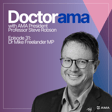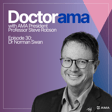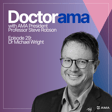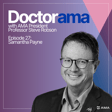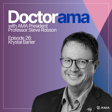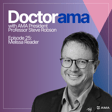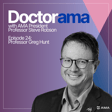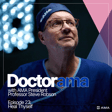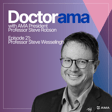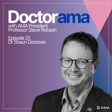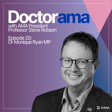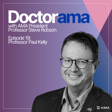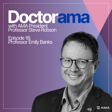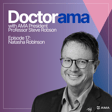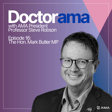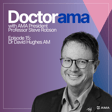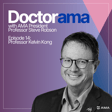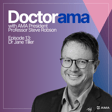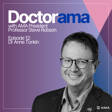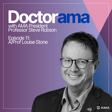Become a Creator today!Start creating today - Share your story with the world!
Start for free
00:00:00
00:00:01

Episode 28 - Dr James Muecke AM
In episode 28 of Doctorama AMA President Professor Steve Robson chats with Dr James Muecke.
Recommended
Transcript
The Importance of Sight and Vision Challenges
00:00:00
Speaker
Well, none of us can underestimate how important it is to be able to see. Sight for all is something we should all aim for, but many people face challenges. Today on Dr Rama, we're going to be talking to someone who is hitting those challenges head on.
Introducing Dr. James Merkey
00:00:20
Speaker
You're listening to Dr Rama with Steve Robson, bringing you the best of health, medicine and people. Well, I'm delighted to say my guest today is Dr. James Merkey. He'll be known to many, many of you. James, welcome to Dr. Rama. Thanks, Steve. Very great to be here this morning. James, I think something that you and I have in common is we both lived in Canberra and I think you had an early part of your schooling in Canberra. Was that because your your family were diplomatic? ah what What was that experience? Yeah, Dad moved to, well, we moved to Canberra when I was five. We actually drove to Canberra on my fifth birthday. I'll never forgive them for that. yeah I was born in Adelaide, Dad got a job in at the CSIRO in Canberra, and I basically did all my schooling in Canberra. I went to ah primary school, high school, missed out on Sydney University Medicine by one mark, and ended up coming to Adelaide as a second choice only because
00:01:14
Speaker
um My girlfriend or my or my friends went there, so it was a bit disappointing, but i my life has been fantastic. I've loved living in Adelaide, spending most of my life in Adelaide, and I'm very happy to to have made this my home. James, I'm not going to tell anyone at the University of Adelaide that they were your second. second Second choice. so When you graduated, ophthalmology was what you trained you. Was that something you'd heard always wanted to do? and And what was it about ophthalmology that appealed to you?
Journey to Ophthalmology
00:01:47
Speaker
It wasn't always what I wanted to do, but what I wanted to do through high school, I knew I wanted to be a surgeon.
00:01:54
Speaker
and I love the idea of microsurgery. Back in my early teens, I would spend hours making model airplanes and tanks and boats and things from from ah World War II. I absolutely loved using my fingers to do fine work. so I knew that I wanted to do surgery and I was really keen on on microsurgery. I worked really hard through high school to get into medicine. I worked really hard through medical school to get into specialty training, particularly surgery. And during my internship, I
00:02:27
Speaker
did a neurosurgical attachment, but I didn't. I didn't love it. And I also did a surgical attachment and plastic surgery, which was another microsurgical specialty. It wasn't something else. ah I thought, it's not for me. And that left me with ophthalmology. And it was always fascinating to me. It was always a bit mysterious. And it was something that ended up being the pathway that I talk. It was it was um ah definitely the right pathway.
Training and Experiences in the UK
00:02:57
Speaker
So you did a part of your training, in fact, in ocular cancers, ocular malignancy in the UK. What was the experience like of that change, that transition from the Australian health system into the NHS? How did you find that?
00:03:13
Speaker
It was intriguing. i mean it was ah it was The fellowship that I undertook was with John Hungerford, who was the greatest ocular oncologist of his day, I would say. and so For me to be one-on-one trained by John at Morfield's Eye Hospital was a special experience. and and I learned so much from John, which I was able to bring back to South Australia. ah In fact in Australia, there was only two ocular oncologists at the time so there was no one in South Australia where to send any of our patients in the state. So it was it was a very special experience what intrigued me I think was the setup at more fields where you had.
00:03:55
Speaker
um patients ah being examined, being having their confidential confidential information discussed, ah basically surrounded by other patients. And so there was privacy was a bit of an issue. I may have changed now, but that wasn't fair. back in 1997-98, but it was certainly intriguing that there was no real primacy to these really important discussions you're having with patients, particularly about cancer and life-threatening conditions. Wow, that's that's really something you'd take a bit of getting used to.
00:04:27
Speaker
um Now you did something unusual.
Transformative Experience in Kenya
00:04:29
Speaker
A lot of people would have put the work in, became a specialist ophthalmologist and set up a practice, but you didn't do that. You spent time in Africa, you went to Jerusalem, Gaza. um ah What drove that decision making, Jones? Why did you do that and what did you get out of it? it was absolutely life-changing all of those experiences in different ways. But I knew through my medical school, we had the opportunity to do a medical elective and I went to Kenya and and that was wonderful in itself. and But I didn't spend a lot of time on my medical elective. I went to Kenya at a national hospital. It was a big zoo. and But in my travels in the country, I came across another couple of medical students who were working in this little hospital in the mountains of central Kenya.
00:05:17
Speaker
So I went up to visit them and I fell in love with this place that was called Tuma Tuma Hospital and and I felt one day I'd love to come back here and work. And so during my internship I was becoming a bit disillusioned, you know, I put all of those literally thousands and thousands of hours in to study through high school and medical school and what I was I think a little disillusioned more than anything was the There was mainly just treating patients who had chronic diseases often preventable diseases often diseases relating to smoking or we're seeing a poor diet starting to creep in at that time as well and
00:05:56
Speaker
You know, diseases that just shouldn't be. And I was alleviating symptoms, prolonging life. But my nature is one that I love a project. I love to be able to have a solution and to be able to fix fix things, cure things. And so it's becoming a bit disillusioned.
Global Projects in Ophthalmology
00:06:14
Speaker
I just needed a break from ah from ophtalmology sorry from from medicine, or at least Western medicine. And so I thought, oh it wouldn't it be great to go back to this hospital in Kenya? So I wrote to the director and he ah received me the following year. So I went from my internship ah into this extraordinary experience in ken in Kenya, where I was essentially on my own, ah very little support. And I was mainly now treating patients
00:06:42
Speaker
who had diseases that weren't chronic, weren't self-inflicted. They were primarily infectious diseases, malaria TB. I was able to undertake surgeries, deliver babies, perform cesarean sections. So this was really something special and I absolutely loved this type of medicine and it reinvigorated my love of medicine. But the idea then of ophthalmology and curing blindness and and particularly blindness in poor communities really appealed and fortunately before I left to go to Kenya I went to visit the director of the department at the Royal Adelaide Hospital, got more at the time and he he he welcomed me and said that I would love for you to come into the training program and whilst I was in Africa I got a call from Colin welcoming me the following year so I came back to Australia to Adelaide and started my ophthalmology training and
00:07:34
Speaker
And then I also, as soon as I started in the training program in Adelaide, there was ah kind of a culture there of ah colleagues who had been to St. John's Eye Hospital in Jerusalem. There was three or four had been ah virtually in a row and wow, it sounded amazing experience. They were all raving about it. So I put my hand up to you then in my final year of training, which was the fourth year of training at the time was to go to St John's Eye Hospital in Jerusalem and that was another life-changing experience but really hammered, cemented me the the idea of of fighting blindness in poor countries, poor communities. That's extraordinary. Now speaking of of um low-income countries,
00:08:18
Speaker
You developed a special bond with Myanmar. Can you tell me a little bit about how that
Founding of SiteForAll
00:08:23
Speaker
came to be? Yes. Well, when I came back to Australia, so I went from Jerusalem, I did a fellowship and in oculoplastic, ophthalmic plastic surgery in England, head back to Australia, then went back to London again to do my ocular oncology, came back in mid-98. and I knew that I wanted to continue to have an engagement in poor communities, poor countries. And so I started getting involved in some research and and teaching projects in Asia. And that started off in Myanmar because um the director of the eye department at the Royal Adelaide Hospital, Dr. Henry Newland, had this a long and strong bond with Myanmar. So that was why Myanmar became the first experience I had in Asia in in teaching.
00:09:07
Speaker
And I realized, my first visit there, which I think was in 1999, that there was a desperate need for subspecialty training, of course, in eye cancers, I had absolutely no idea. um But, and that wasn't their fault, they just hadn't been exposed to that. So it was mainly in in many of these poorer countries, the focus had been on cataract blindness, which was of course, the leading cause of blindness in the world and and also in in these poor countries, it's a significant problem. so ah but But virtually all other areas of my profession, ophthalmology, had been ah either neglected or were being mismanaged. So I realized that there was this huge need for subspecialty training.
00:09:53
Speaker
And that's what I embarked upon, and starting with Myanmar and then expanding. Now we've had projects with SiteForAll in 10 countries in Asia. We're now in in Africa and the Pacific and also in Australia and mainstream and Aboriginal communities.
Initiatives Against Diabetes-Related Eye Disease
00:10:08
Speaker
so James, tell me a little bit about how you came to set up SiteForAll and what it's all about. So SiteForAll evolved from what was called the Vision Myanmar program. So Myanmar was our our core, the country that we we really had, the this as I mentioned, this long and strong relationship with. and But there was also a desire to replicate the model that we were creating in a number of other countries in Asia. So over a period of a few years, I visited a number of other countries in Asia and
00:10:45
Speaker
basically just assessing, doing a capacity assessment and realising yet again over and over that there was a great need for subspecialty training. And so we started implementing projects in a number of countries and then to raise funds, ah to raise awareness for the work we were doing, we felt it was important to set up a not-for-profit. And so I think it was in 2008, we set up Site 4 as a not-for-profit. But really, I think the driving the driving force for me and that really instilled the passion in me for doing this was a childhood blindness study that I was involved in in 2007 in Myanmar, where we found that half the kids had blindness that could have been prevented or treated. But ah the really powerful finding was that the leading cause of blindness, which was measles, so
00:11:38
Speaker
and and And as medical practitioners, some of us might be aware that measles is a blinding disease, um but to be surrounded by children who are needlessly blind, irreversibly blind, horribly disfigured, and in in so many schools around the country, in so many schools for the blind around the country, was at that time absolutely confronting and and probably the most powerful ah experience that I've had, and it really made me realize how important, again, subspecialty training was, that this focus had been on cataract blindness, but actually 50% of the world's blindness is conditions other than cataract. And childhood blindness is one of those things that have been neglected in in many of these countries. There wasn't a single pediatric eye specialist for a country of over 50 million people at the time. So on the back of that study, and I came home after the study, I wrote it up, I went back to Myanmar twice, met with the health minister a couple of times,
00:12:37
Speaker
ah encourage them that this is something that they really needed. You need to have a ah children's eye specialist in the country, not just to treat the blinding diseases of charter, but also advocate for children with blinding yet preventable diseases such as measles or simply a lack of spectacles. So in 2010, we bought a young ophthalmologist from from Yangonai Hospital in the capital city to Australia to train at the Women's and Children's Hospital, hands-on for a year. And he went back as the first pediatric ophthalmologist in his country. We set him up in the country's first children's eye unit at Yangonai Hospital. And it all rolled on from there. We we then and started training pediatric ophthalmologists, often the first in the country. It's in a number of countries in Indonesia. And my profession is is has 10 subspecialties, including optometry.
00:13:26
Speaker
and we started getting involved in subspecialty training. not just the training, but also providing the equipment to enhance the training and also that they can then use to continue to do what they need to do in their countries after the training is finished. Yeah, that sustainability is such a big a big issue. James, so I want
Proposals for Combating Diabetes
00:13:45
Speaker
to bring you forward. um We've just seen the release of the parliamentary report into diabetes and I know that preventable eye disease associated with adult onset diabetes is a big interest of yours.
00:13:58
Speaker
I wonder if you'd just tell me a little bit about how you came to have this disinter interest first of all. Well, as an ophthalmologist for 35 years now, and unbelievably, I've been dealing with the blinding consequences of diabetes, all types of diabetes. But what I've noticed over the last 35 years is the growth of type 2 diabetes, which is a largely man-made and avoidable dietary disease. And it's been disturbing for me to see this rise in in people with sight-threatening eye disease. I have quite literally hundreds of patients that I'm actively treating every week. But I think the most confronting experience I had was back in 2018. I was wanting to create a documentary on the experience of blindness, what it means to be blind. And I interviewed four people, four children who were all born blind, who had fascinating stories.
00:14:52
Speaker
and four people who were slowly going blind at the end of their lives who were adapting quite well. And their stories weren't so powerful, but the two people that had the the most powerful impact on me were two people in the prime of their lives who both were blind in both eyes as a result of their diabetes. And particularly one a guy called Neil Hansel, who actually came onto the stage when I was awarded Australian of the Year. He went to bed one night at the age of 50 and woke up the next morning blind in both eyes and remains blind to their stay. And his story was so powerful. We created an ad in late 2018 encouraging people to have their eyes checked if they have diabetes. Now there's probably close to 2 million people in this country with diabetes, of type one and type two. yeah And well over half are not having the regular all important sites having ear checks. That's why it's become the leading cause of blindness amongst working age adults in this country. And when I received South Australia in the year,
00:15:48
Speaker
award in in in late 2019. That was my aim, to encourage people to have their eyes checked. I wasn't expecting to become South Australian of the Year, but leading up to Australian of the Year ceremony in January 2020, I thought, well, If I'm going to become Australian of the year, I very much doubt I will. But if I do happen to win it, and I'm a doctor, and what's Australia's biggest biggest health crisis? It's type 2 diabetes. So yeah this is this is a thing that I started to get involved in. I started to read deeply and widely. and
00:16:23
Speaker
found myself in this space in early 2020 when I was awarded Australian of the Year. James, the Australian of the Year I think for you was was made a different experience because of the the pandemic but still you were tireless in your advocacy. What do you think we need to do to deal with the effects of type 2 diabetes in this country? You clearly have thought about this a great deal. Yes, um I have. And I've come up with a strategy which involves three actions of awareness, accountability and assistance. But let's go back to the and parliamentary inquiry, which was in November last year. yeah And i I chose three areas to focus on because I only had a few minutes. I chose three areas to focus on during that
00:17:16
Speaker
that my my opportunity of evidence. One was our dietary guidelines, Australian dietary guidelines, which at the last draft or the last edition came out in 2013. There was significant bias in that document, significant conflicts of interest which were in involved in the creation of that document. And I still think that needs to be held to account. and How was that allowed to happen? But more to the point they actually worked? Well, as a result of our obesity and type 2 diabetes epidemic, they clearly haven't worked. yeah And the document is a high carbohydrate eating recommendation, which is the last thing that people with
00:18:01
Speaker
traditional resistance and obesity and type 2 diabetes need to be you know these are people who are carbohydrate intolerant and actually if you realize that two-thirds of Australian adults are overweight or obese and a quarter of our kids then these guidelines are completely inappropriate they hold no place in the management of type 2 diabetes. So we need to move away from the Australian dietary guidelines as as a document which guides the eating of for people with type 2 diabetes and with type 1 diabetes. ah But what's concerning is also this document is being used by various bodies. It's still being used by Diabetes Australia, although Diabetes Australia is is certainly shifting its approach now, which is which is excellent. So type 2 diabetes, um the Royal College of GPs recommend it by the Australian Dietary Guidelines if you have type 2 diabetes.
00:18:55
Speaker
ah Diabetes Australia, Dietitians Australia, a bunch of ah these organizations still recommend that people with diabetes eat lots of carbs, which just makes no sense to me. So that's the first thing. ah The second thing is our unhealthy food environment. we You'll probably notice you go into the service station, you yeah with the water v you check out from the supermarket, even chemists these days and it's half price chocolates and sugary drinks. So we need to We need to improve our food environment. And there is a number of ways we can do this. And it comes down to three sub strategies that say ah pricing, proximity and temporality. So pricing, for example, the um recommendation is some of you be aware from the parliamentary report was a tax on on sugary drinks. Yes, that's been shown to work in over 100 jurisdictions around the world, but reduced purchase and consumption of sugary drinks.
00:19:52
Speaker
But I've moved away from that in recent years and I've i've moved more towards recommending it. And i've I've had meetings with the health minister, both local and federal health minister. to remove ah the tax breaks for marketing sugary, not just sugary drinks, but products by the ultra-processed food industry, the sugary drinks industry and the fast food industry. So they currently is about $5 billion in tax breaks every year for these industries. Now, could you imagine what that money would be used for? Most of that money goes offshore to the big multinationals.
00:20:29
Speaker
Nothing to say in Australia, what we use that money for would be so many opportunities to help turn this diabetes epidemic around. Proximity, a couple of examples here would be to remove junk food from vending machines and cafeterias and hospitals and and nursing homes. And temporality, an example here would be to remove um ads for sugary products during those hours when our kids are watching TV. And the final thing that I mentioned in the parliamentary inquiry was to remove the vested interests which are driving our education education of doctors, nutritionists, dieticians in medical school. We are basically trained to medicate.
00:21:13
Speaker
We're in a Medicaid paradigm and also the training of dieticians, for example, is heavily influenced by the food industry. So we have the pharmaceutical and the food industry really dictating what is being consumed at the moment. So all of these things need to be addressed and that's just really scratching the surface, Steve. James, you are a person on a mission and I know that you have much, much more um ah work that you want to do
Engaging Medical Professionals in Diet Change
00:21:42
Speaker
and achieve. And in fact, what I'd like to do is suggest that we talk again and talk again soon. I think um there's so much going on and you're doing fascinating work with with using um dietary things to assist with eye conditions and so on. I want to thank you so much today. And I just, I guess as a final wrap up James,
00:22:03
Speaker
Where do you see your work going over the next few years? What's on the agenda for you? Well, the great thing is when i I was actually put on the National Diabetes Strategy ah Expert Advisory Group back in 2020 when I was Australian of the year and I was able to get remission of type 2 diabetes in that document for the first time. I then started to right to the GPs of my patients who had site-threatening eye disease that I was actively treating, suggesting that ah we should explore this incredible opportunity to put their diabetes into remission using a low carbohydrate dietary approach.
00:22:46
Speaker
and What I started to see unfold then was the number of patients whose GPS is engaged and we were then they were coming back. and So having injections into their eyes on a regular basis. I can still remember the first first patient who put his diabetes into remission. He came off his insulin pretty quickly, came off all his medicines, lost a bunch of weight. He said he'd never felt better and he started seeing better. Yeah. What's extraordinary is that over the next two or three years, I was able to wean him off completely his injections, which he'd been having for years every couple of months in both eyes. and That was absolutely extraordinary. and I was starting to get a bit of pushback from some of the endocrinologists in town. and so I thought, well, let's let's get everyone together. Let's get the low-carb practitioners and the endocrinologists together to
00:23:30
Speaker
have a round table to discuss what their concerns are and address their concerns and we did that and as a result of that, one of the endocrinologists, ah Steve Tranks, one of the low-carb practitioners and Adelaide, Lorraine Lawless-Smith got together and wrote guidelines for what we call therapeutic carbohydrate reduction for patients with type 2 diabetes and that was ah finalized early this year and was ah subsequently approved by the Australian Diabetes Society and Diabetes Australia and that's been so exciting. It's a really a turning point. This opportunity for patients to turn their diabetes around is is the most exciting thing I've been involved in in my 40-year medical career. I'd like all my colleagues to be involved and to be excited and experienced. It is truly amazing. So what's unfolding as we speak is that we've got a 10 module course which we're delivering to
00:24:22
Speaker
ah Dietitians Australia later this year in conjunction with the Australian Metabolic Health Society. The Australian Metabolic Health Society in conjunction with Peter Brookner's group, Defeat Diabetes, is now looking at um educating GPs as well and we're now also reaching out to medical schools to try and embed this in the curriculum. So plenty of work still to be done but I think we are seeing a shift now and it's super exciting.
Continuing Advocacy and Impact
00:24:48
Speaker
James it's been an absolute pleasure speaking with you today and I think we've got a lot more to talk about so we might try and book a date to talk again but I want to thank you so much for joining me on Dr Rama. Absolutely Steve, pleasure to be here and and thank you for all you're doing as well.
00:25:13
Speaker
You've been listening to Dr Rama, a podcast produced on Ngunnawal country by the Australian Medical Association. All rights reserved.
